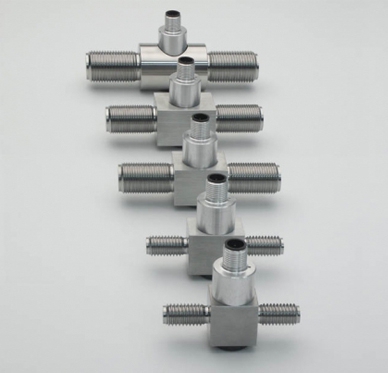
A transformation is currently taking place: Linear drives are taking the place of pneumatic and hydraulic drives, and there is no longer any scope for measuring pressure. However, WIKA has another solution: force measurement.
Electrical propulsion technology is increasingly replacing hydraulic or pneumatic cylinders. For this newer approach, however, it is necessary to implement force measurement using force transducers/force sensors, as force measurement through pressure measurement in a hydraulic unit or pneumatics is simply not possible. A typical example for this is linear drives.
The Need for Force Measurement in Linear Drives
A linear drive is a drive system that leads to a translational movement. Machine elements or system parts are accelerated in a straight line. It makes sense to offer force measurement in such drives, as hydraulically and pneumatically powered drive elements are being replaced by a combination of electric motor and mechanical thrust units. These modern drive systems are kept simple via modular systems but can, nevertheless, be adapted to individual customer applications with little effort. They also feature a high level of versatility. However, pressure measurement is no longer possible here.
The Advantages of Force Measurement
This change offers the perfect opportunity to measure forces directly in the process. Force measurement can be used with practically any linear drive. For precise measurements, it doesn’t matter where the force transducer is integrated within the force flow. It can be directly on the motor, on the actuator, or at the point of force application. Force can be identified reliably at any point in the force flow.

WIKA’s F2301 force transducers are suitable for force measurement in linear drives.
Force Measurement: WIKA Products in Applications
For force measurement, use thin-film sensors – which are welded onto the measuring tubes of the force transducers – from WIKA’s volume production. With our different force transducer solutions, from the standard to the miniature tension and compression force transducers, the optimum solution can be found for every application. This might involve controlling joining forces on electrically powered spindle presses, or monitoring the overload protection in lifting cylinders. The robotic arms of gripping and clamping robots, as well as punches, presses, and welding tongs, can also be measured. With the successful application for the EU “Clean Sky 2” project, the sensors also meet the extremely high safety requirements of the aviation industry.
High-quality force transducers are one of the reasons why Tecsis, as the force measurement specialist within the WIKA group, is renowned for innovative quality solutions in metrology and sensor technology.

